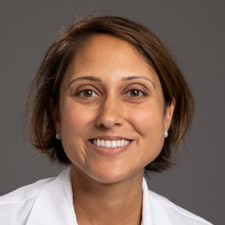If there’s one takeaway pearl that Ruchi M. Fitzgerald, MD, hopes her students and residents receive during their rotations, it is that treatment saves lives for those with a substance-use disorder (SUD), depression, anxiety or other stigma-laden condition—including those within the medical profession.

Ruchi Fitzgerald, MD
“Paradoxically, the general public probably has an easier time accepting treatment than those within the practice of medicine,” said Dr. Fitzgerald, a family physician, addiction medicine physician and service chief of inpatient addiction medicine at PCC Community Wellness, a health center system serving the West Side of Chicago.
“Medical school and residency already put incredible pressure on early-career physicians, and that can be extremely frightening—and in far too many situations, we see and hear of people dying by suicide,” Dr. Fitzgerald added. “It’s heartbreaking.”
COVID-19 heightens need for awareness
Isolation from the pandemic, long work hours, and financial debt are some of the risk factors that medical students have noted in a simulated physician SUD case assignment, according to Dr. Fitzgerald, an assistant professor in the departments of family medicine and psychiatry and behavioral sciences at Rush University, where she is the associate program director of the Rush Addiction Medicine Fellowship.
She said that this is just one of the reasons why it’s essential to heighten awareness amongst faculty that offering more education and resources on the topics of physician mental health, SUD and wellness would be useful in the curriculum.
During her addiction medicine fellowship at Rush University in Chicago, Dr. Fitzgerald worked with other committed addiction medicine faculty to start a SUD curriculum titled RISE (Rush Integrative Substance-Use Disorder Education).
Part of the curriculum includes education/awareness on special topics like stigma, overdose prevention, physicians and SUD. This year RISE will highlight physician suicide awareness/prevention with the AMA.
“Students and residents—like all of us—have been tested severely by the COVID pandemic,” Dr. Fitzgerald noted. “They have been front-line workers and overwhelmed in ways we did not anticipate. We need to do better to reach out, protect them and ensure that they are aware of the available resources—without fear of repercussions.”
There are many studies, media reports and other information that highlight the rates of depression and suicidal ideation in the medical profession, including medical students. The AMA also has dedicated multiple resources to help physicians identify colleagues and others who may be at increased risk to help them get the support they need. This includes a practice module and advocacy issue brief concerning practical tips and ways to reform state law and regulation to increase access to confidential, evidence-based care.
“There are so many fears associated with receiving treatment for a substance-use disorder as a physician,” said Dr Fitzgerald. “Those fears put up walls—and for many, they are a permanent wall—to asking for help. There is always a concern about how receiving help will affect one’s career and medical licensure.”
Sharing her story
In her own career path, Dr. Fitzgerald said that she came to realize that a Physician Health Program (PHP) is one of the important options to support physicians in their recovery process using evidence-based treatment methods.
“I share my story openly to shatter stigma around substance-use disorders, in the hopes that another health care professional has the courage to reach out for help too,” said Dr. Fitzgerald.
“I know how hard it is to say you need help because I know how hard it was for me to ask for help,” said Dr. Fitzgerald. “Early in my career, I was sanctioned and sought help in a PHP for my opioid-use disorder. It was terrifying to me that my medical career might be over, but I had such great care. The compassion within the PHP structure made me realize that I didn’t need to hide what happened to me, but that I could help others by being up front and honest about the fact that treatment saved my life and my career.”
Dr. Fitzgerald said that, as a physician in long-term recovery, she shares her story to help change the narrative and offer hope to others who may be struggling. She also emphasizes the importance of modeling RMC values, non-stigmatizing language and her training as a family physician, addiction medicine physician and medical educator with all her patients—at RMC and for the medically underserved West Side community—all while teaching medical students, residents and fellows.
“I love the work that I do and feel incredibly fortunate to be in a space where I can affect change as a medical educator,” Dr. Fitzgerald said. “I am married with three children, and I believe that also changes the typical stereotype of how we view the classic person who may have a substance-use disorder.
“This illness does not discriminate in who it may affect,” she added. “How we support those who have it is our choice, however. It is always disheartening to hear when those in the medical profession view addiction as a character flaw rather than a chronic disease.”
Source: https://www.ama-assn.org/delivering-care/opioids/curriculum-emphasizes-medical-student-and-physician-mental-health

COMMENTS